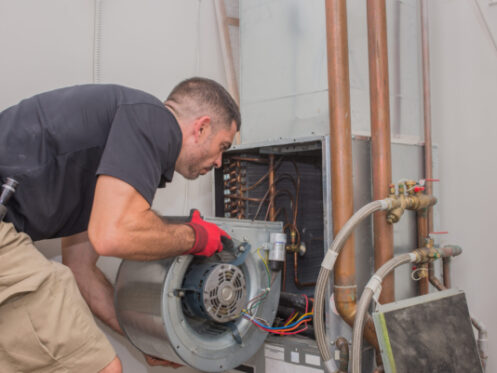An air handler is the key to a well-ventilated home. It works alongside your air conditioner and heat pump as a “fan coil unit” with the primary function being to circulate air through your home to maintain your desired temperature.
So, What Does an Air Handler Do?
An air handler is a vital component of an HVAC system that is responsible for circulating conditioned air throughout your home. It consists of a blower fan, heating or cooling coils, filters, and controls. The air handler connects to the ductwork and distributes conditioned air to various rooms. It also helps maintain the desired indoor temperature by circulating air over the heating or cooling coils, which heat or cool the air as needed. Additionally, the filters in the air handler help remove dust, pollen, and other contaminants from the air, improving indoor air quality.
What is the Average Lifespan of an Air Handler?
Air handlers typically last between 10 and 15 years. There are, however, varying degrees of difficulty based on the owner and the quality of the unit. The most important factors affecting lifespan are maintenance and usage. Regular maintenance, including cleaning or replacing filters, checking electrical connections, and lubricating moving parts, can help increase the lifespan of an air handler. It’s also important to consider the climate and environmental conditions in which the unit operates. Do you live in an area with high humidity or excessive dust? If so, the air handler may experience more strain and have a shorter lifespan.
Why is My Air Handler Leaking Water?
Water leaking from the air handler is a common problem! One possible reason is a clogged condensate drain line. Over time, dust and debris can accumulate in the drain line, leading to a blockage. As a result of this blockage, water backs up in the air handler and leaks out. Another cause could be a damaged or blocked evaporator coil. If the coil becomes dirty or damaged, it can freeze up and then thaw, resulting in water leakage. Finally, a malfunctioning condensate pump can also leak water. As this pump removes excess water from the air handler, it may leak if it stops working properly.
How Often Should I Change Air Handler Filters?
The frequency of air filter changes for an air handler depends on several factors… the type of filter being used, the air quality in the area, and the level of usage. Generally, it is recommended to replace standard 1-inch filters every 1 to 3 months. In case of pets, allergies, or a dusty environment, you may need to change your filters more often. An important note in changing air handler filters: neglecting to change the air filters regularly can lead to reduced airflow, decreased efficiency, and increased strain on the air handler.
What Size Air Handler Do I Need for My Home?
In order to determine the appropriate size of an air handler for your home, several factors need to be considered. These include the size of your home, the number of occupants, the climate in your area, the level of insulation, and the number and size of windows. It is crucial to have an HVAC professional perform a load calculation to accurately determine the size of the air handler needed for efficient cooling and heating. Oversized or undersized air handlers can result in inadequate temperature control, poor energy efficiency, and increased operational costs. That’s why we offer in-home visits at Comfort Zone where our licensed contractors will come out and inspect your unit space, take measurements and offer you the highest quality HVAC system suggestions based on your needs.
Can an Air Handler Be Installed Outdoors?
Air handlers are generally designed to be installed indoors, typically in the basement, attic, or utility room. They are not intended to be exposed to outdoor elements. However, in some situations, an air handler can be installed in an outdoor location if specific requirements are met. These requirements may include installing the air handler in a weatherproof enclosure or using an outdoor-rated air handler specifically designed for outdoor installation. It is essential to consult with an HVAC professional to determine if an outdoor installation is feasible and suitable for your specific needs.
Remember, if you have any further questions or concerns about air handlers or any other HVAC-related topics, it’s always best to consult with a professional HVAC technician who can provide expert advice and assistance tailored to your home’s needs. Give us a call today with any questions (289) 277-6616!




